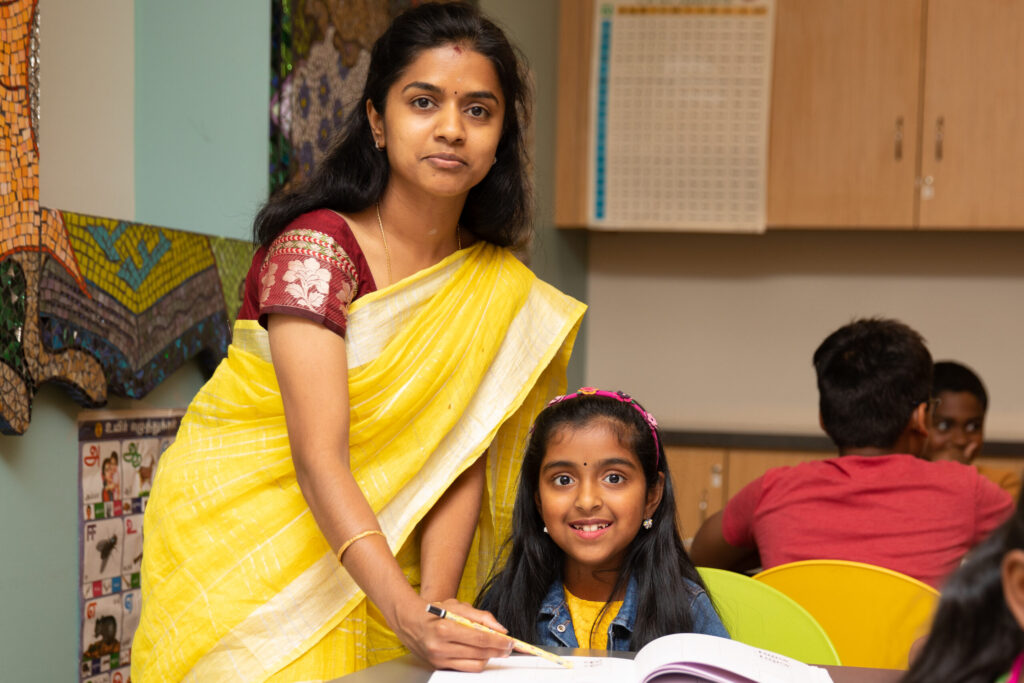
In addition to the structured grade-level curriculum, students at MTS Tamil Schools engage with the Tamil language through a variety of interactive and enriching experiences. These include fun activities, games, project presentations, and access to a well-stocked Tamil library.
Students also have valuable opportunities to participate in school assemblies, helping them build confidence in public speaking, develop communication skills, and foster a strong sense of Tamil school spirit and community.
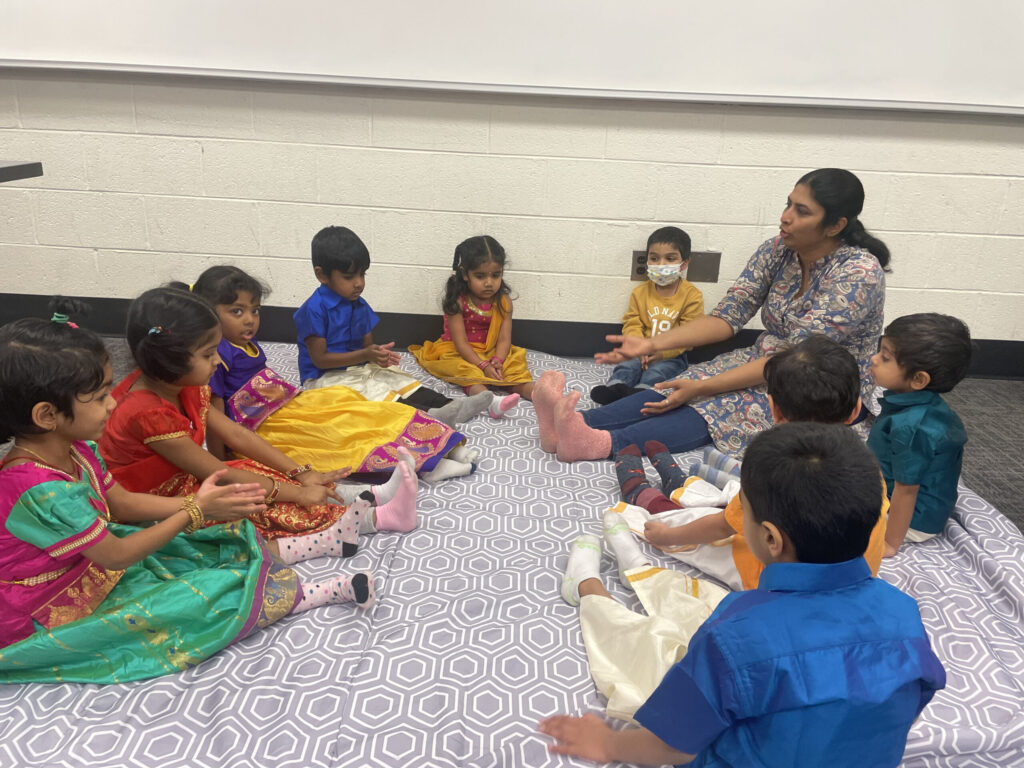
Our preschool curriculum introduces young learners to simple and commonly used Tamil words through engaging stories and fun-filled activities. The focus is on helping children become comfortable with the language in a playful and nurturing environment.
Children are encouraged to speak in easy, everyday Tamil sentences—such as greeting others, introducing themselves, and sharing their age—laying a strong foundation for confident communication in Tamil.

At the Kindergarten level, children are introduced to the basics of the Tamil script, including Uyir (vowels), Mei (consonants), and Uyirmei (vowel consonants)—with a focus on Agara Varisai and Aagara Varisai.
Students begin reading simple two-letter words and learn to distinguish between short and long vowel sounds. The curriculum also introduces everyday vocabulary such as days of the week, numbers, family relationships, colors, and body parts.
Through short rhymes and interactive activities, children develop the ability to hold simple conversations in Tamil, building both language skills and confidence.
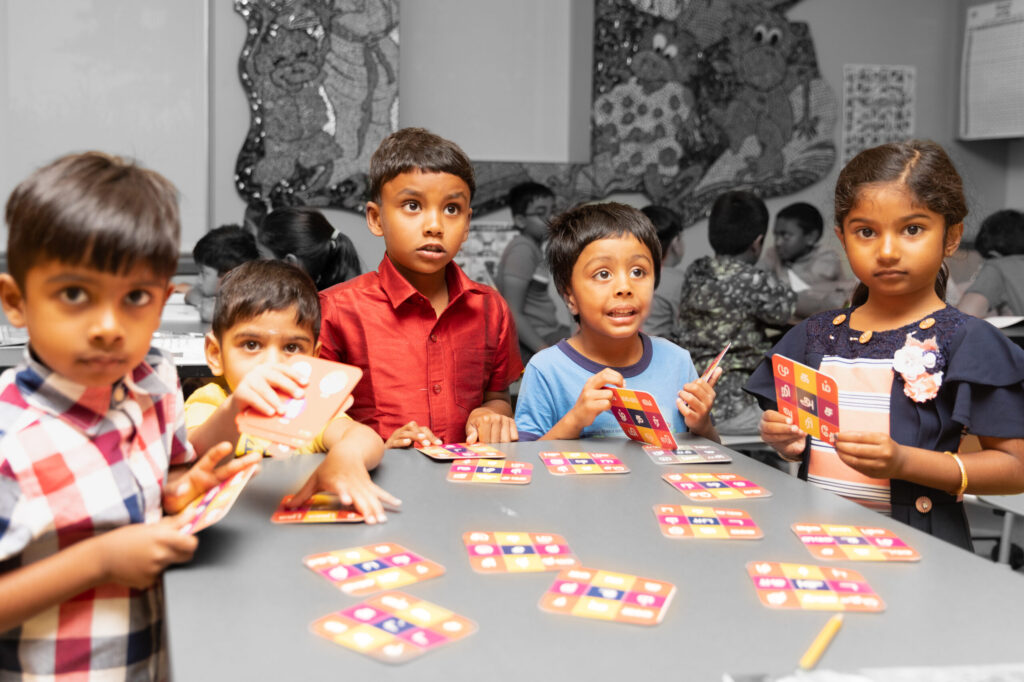
In Grade 1, students review Uyir and Mei letters and are introduced to the initial series of Uyirmei letters, up to Uugara Varisai. They begin reading 2- to 4-letter words and forming simple phrases and sentences.
Students also develop the ability to spell words based on pronunciation, enhancing their phonetic understanding. The vocabulary expands to include weekdays, numbers, family relationships, colors, body parts, vegetables, fruits, flowers, and domestic animals.
Through engaging activities, children learn to recite short rhymes, narrate simple stories, and answer basic questions, building both language fluency and confidence in communication.
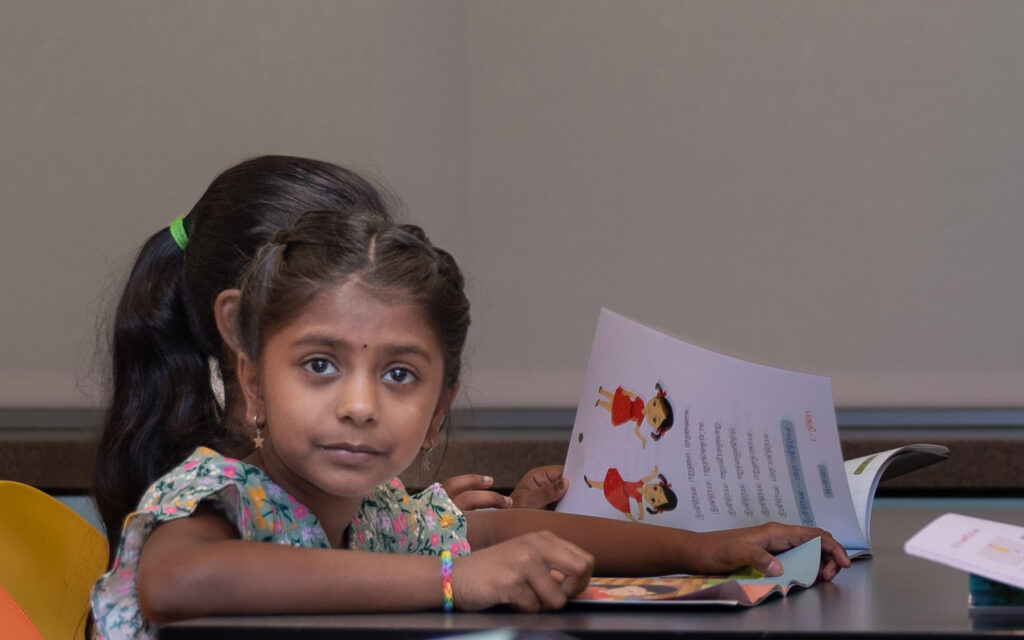
In Grade 2, students complete their learning of the remaining Uyirmei letter series and gain a solid understanding of all Tamil letters and their classifications.
They develop fluency in reading simple sentences and beginner-level Tamil books, and are encouraged to converse comfortably in Tamil through interactive speaking activities. This level focuses on strengthening both reading comprehension and verbal communication skills, laying a strong foundation for advanced language learning.
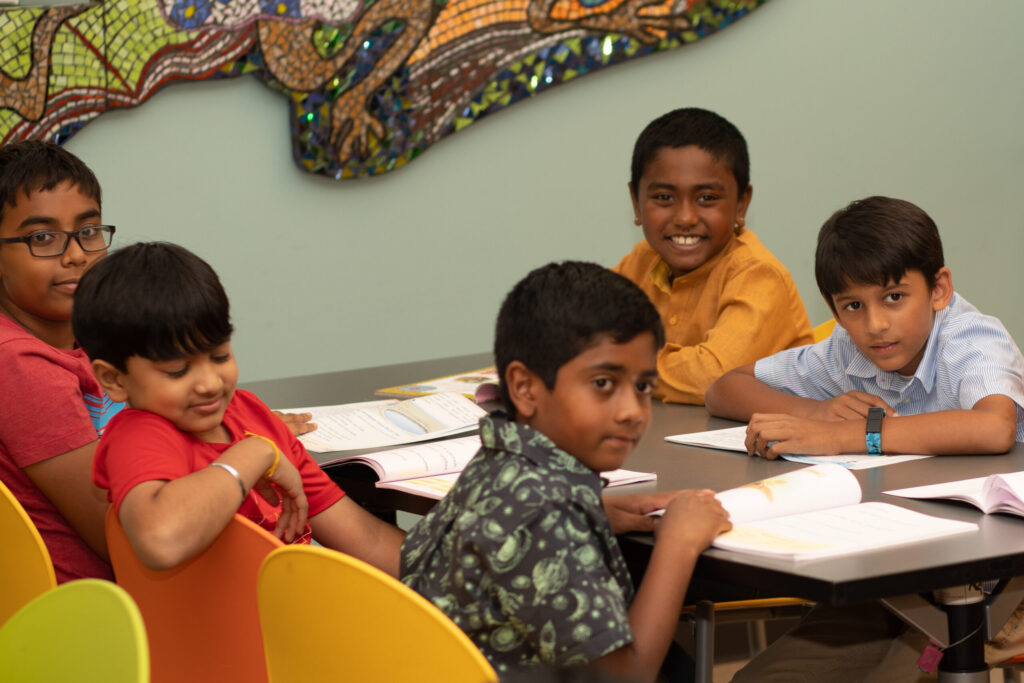
In Grade 3, students are introduced to a wide range of new vocabulary, along with their pronunciation, meanings, and usage in context. They continue to build fluency by reading sentences confidently and constructing their own simple sentences.
Class discussions explore various places and everyday situations, helping students apply their language skills in real-life contexts. They also read stories and rhymes, with a focus on comprehension and interpretation.
Learning is made enjoyable through interactive, game-based activities, encouraging active participation and reinforcing language skills in a fun and engaging way.
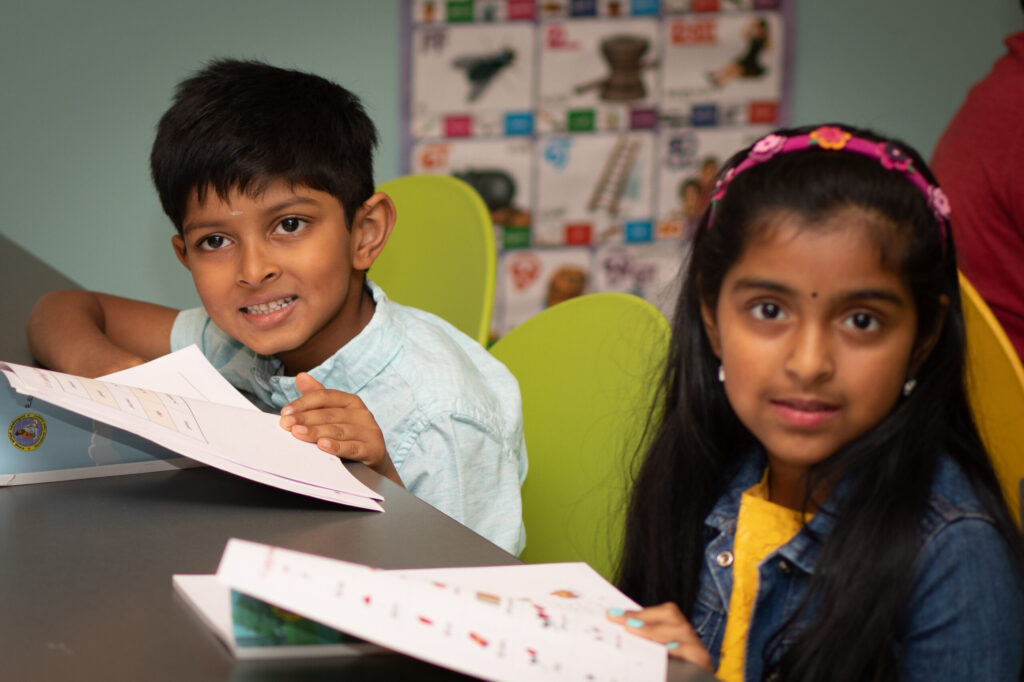
In Grade 4, students receive focused practice in reading sentences fluently and expressively, enhancing both clarity and emotion in their speech. They read short stories, develop comprehension skills, and learn to answer questions based on the text.
With teacher support, students begin to write simple sentences using dictation words, gradually building their writing confidence. Basic grammar concepts are introduced through fun, interactive activities, and students explore Thirukkural through engaging stories that highlight its meaning and relevance.
By the end of the year, students are encouraged to converse fluently in Tamil, applying their language skills in a variety of everyday situations.
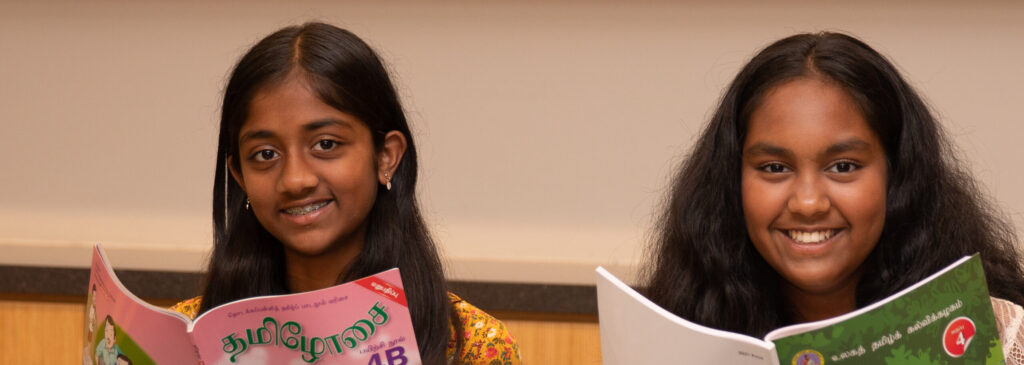
In Grade 5, students continue to strengthen their reading skills with special practice in reading sentences fluently and expressively. They begin to write simple sentences independently, using dictation words and learning to avoid common spelling mistakes.
Students are introduced to basic article writing, helping them organize and express their thoughts more clearly. Grammar concepts are taught through engaging activities, and Thirukkural is explored through meaningful stories that highlight its moral and cultural significance.
Learners also develop their speaking skills by narrating stories, and confidently describing pictures, situations, or topics. They enhance their comprehension abilities by listening, reading, and responding to questions with clarity.
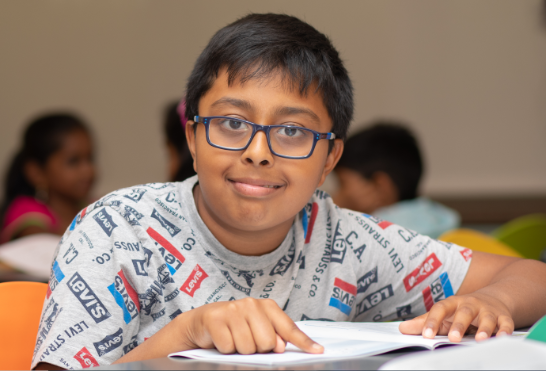
The Grade 6 curriculum builds upon the foundation laid in Grade 5, offering expanded practice with more advanced examples and applications. Students continue to refine their skills in reading fluently and expressively, writing with accuracy, and constructing well-formed sentences and short articles.
They explore grammar concepts in greater depth through interactive activities and continue to study Thirukkural, gaining a deeper understanding of its meaning and relevance.
Students are encouraged to speak confidently on a variety of topics, describe pictures and situations, and respond thoughtfully to comprehension questions, further developing their fluency and critical thinking in Tamil.
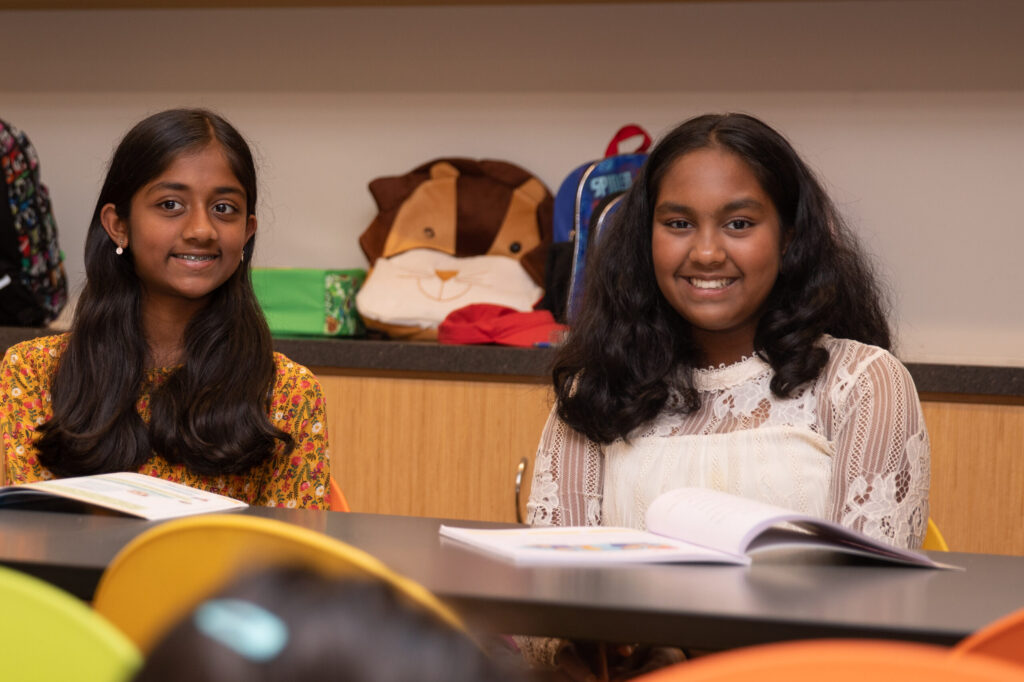
The Grade 7 curriculum is a continuation of the Grade 6 syllabus, with a focus on deeper understanding and broader application of previously learned concepts. Students engage with more complex examples in reading, writing, and grammar, enhancing their ability to express ideas clearly and effectively.
They continue to explore Thirukkural with greater insight, and practice writing longer passages and structured articles. Speaking and comprehension skills are further developed through discussions, storytelling, and topic-based presentations, encouraging fluency and confidence in both formal and informal communication.

In Grade 8, students focus on effective reading and comprehension, developing the ability to understand and interpret more complex texts. They practice constructing grammatically correct sentences and expressing ideas clearly in both written and spoken Tamil.
Students are encouraged to write articles and speak confidently on given topics, enhancing their communication and critical thinking skills. The curriculum includes deeper exploration of Thirukkural, with emphasis on understanding its meaning and relevance.
Additionally, students learn to write short stories using given prompts or hints, fostering creativity and narrative skills.